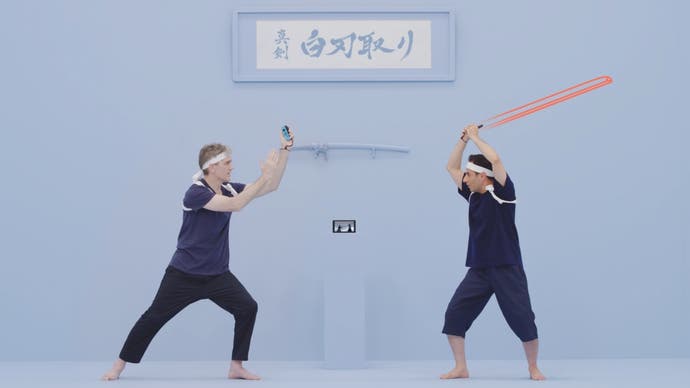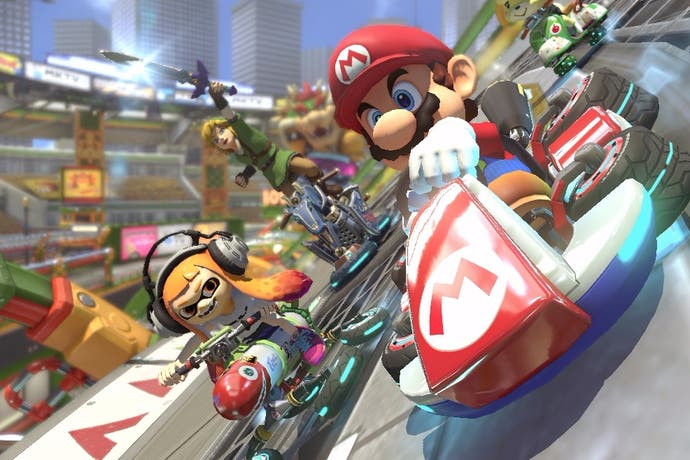Why the Switch is Nintendo's truest Family Computer
Six months in, the Switch is bringing us together.
I'm 200 miles from home, holidaying in a part of Devon with no phone signal, barely any roads of sensible passing width, and two moaning, groaning children in tow. It's hammering it down outside, ponds forming on driveways - the very epitome of a British summer's day. The DVD collection available is a lot of seen-its. My Neighbor Totoro fills a pocket of the day, alleviating some of the boredom. But man, it's grim out there. No sandcastles at the beach today, kids.
But we do have Mario Kart, and cluster around it, Switch Joy-Cons snugly slipped into plastic wheel peripherals perfect for small hands (and useless for most fully grown ones). Strictly 50CC and safety features on, because these drivers still have their L-plates - but that's OK, when finishing tenth is still met by smiles (you finish, you "win", being the thinking). There's Zelda as well, to play as a unit, collaboratively picking out parts of the map our hero's path hasn't yet reached. Might be a Korok Seed, might well be nothing - the joy, 150 hours in, is the journey you haven't taken before.
Over the course of a week's break, we also get familiar, as a family, with ARMS - at least, as best we can without the kinda-necessary wrist straps. And 1-2-Switch comes into its own as a short-session pre-mealtime distraction, keeping little people out of the kitchen as the grown-ups get things ready. (Samurai Training, FTW.) There's time, too, for a taste of Snake Pass - but it turns out that three-year-olds aren't patient enough to learn how best to slither.
When I stuffed the Switch into my backpack, in a rush on the morning of heading west, I didn't really imagine it being so useful, so frequently, expecting instead to turn it on just a couple of times for my own pleasure. But then, who amongst us really foresaw this curious contraption taking off in the way it has, since launching back at the beginning of March?

The sold-out notices tell one story; the critical acclaim for its standout games another. But early adopters will always flock to fresh stock. What's really telling, for me, is the runaway success of the system as a concept. Whether intentional or not, with the Switch Nintendo has made good, more than ever before, on its long-held intention of delivering a Family Computer. This is that ambition finally, and I think fully, achieved.
When the Switch was formally revealed in October 2016, its trailer foretold of a fantastic utopia where video games smoothly slotted into place around the demands of various busy lifestyles. While travelling or between work meetings, for rooftop partying or before-the-big-game practise, the console was pitched as a system set to revolutionise play as we knew it. Naturally, many in the games media shot it an optimistic yet cynical eye, knowing as we do how this industry plays us just as much as we love to be enveloped by its finest offerings.
And yet, here we are. Six months after its launch, to look at how Nintendo's newest console operates as this bridge between handheld and home gaming, is to see that proposition, that announcement video vision, become a brilliant reality. We were shown a console offering both five-minute bursts of entertainment between bus stops and several-hours-deep binges from a sofa perspective. And that is exactly the console we've been enjoying.
We've seen strangers on a train pick up Joy-Cons to go head-to-head on Mario Kart 8 Deluxe. Breath of the Wild has been a genuine revelation, a widest-of-screens adventure that fits in your hands, if not many pockets - if only nu-metal bagginess was fashionable in the here and now.

As if to vindicate the advertising, the Switch has quickly become a home for great, accessible party games old and new - sluggers can grab a pad, or a pair of them, and take each other on in ARMS or Ultra Street Fighter II, and there's terrific local co-op and competitive options in the shapes of Overcooked and Puyo Puyo Tetris. Splatoon 2 has proven an instant online hit, as befits its brilliance, and there's more to come in terms of 'net-connected multiplayer fare, as Rocket League and FIFA arrive on the hybrid system.
But for as long as there have been video games and systems to play them at home on, there have been games "for everyone"; which is to say, it's been a long time since a cavalcade of Pong Clones dominated the market. So it's natural that, even this early into its lifecycle, the Switch would have many and varied software options.
The same was true of Nintendo's Famicom - when it came West as the NES in late 1985, more than two years after its Donkey Kong-dominated Japanese debut, the 8-bit system launched with 16 games, from sports sims like Baseball and Tennis through to more noteworthy offerings of the era, such as Ice Climber, Excitebike and Super Mario Bros.
The public perception of video games in the early and mid-1980s, though, was very different to how they are now seen, with marketing in the West typically directed at children and teenagers. One could argue that, in the UK, Nintendo tried to court a slightly older crowd, shortly before PlayStation arrived on an unprecedented wave of cool, by recruiting The Young Ones and Bottom star Rik Mayall for its TV advertising; but the "Now You're Playing With Power" campaign, and later NES commercials, starred actors who'd look right at home in Grange Hill or Byker Grove.
In my experience, evidenced on holiday, the Switch has a considerably broader appeal, with even the kids' grandparents taking an interest. And it's through the consoles, and the games, that Nintendo has researched and realised over the intervening years, that the company has been able to refine its Famicom aspirations. The Switch feels like the natural conclusion to decades of invention, feedback, and understanding.
The Wii played a vital part. Its easy-to-understand motion controls were appealing to audiences previously turned off by a multitude of buttons bearing all manner of numbers, letters and symbols, which only appeared to increase in volume with each console generation. The system's 100 million sales, placing it significantly ahead of its contemporaries, the PlayStation 3 and Xbox 360, are indicative of its broad appeal - nobody could argue that the Wii had better games than its rivals, but it sure made what it had easier to play, and the likes of Wii Sports and Wii Party were perfect for social occasions.
The Switch, with its motion-sensitive Joy-Cons (a pair as standard!), borrows from the Wii that "when I swing, that swings" level of logic. When playing ARMS, for example, its "the left controller is your left hand" transparency makes adoption of the basics instant, so much more effectively than mapping four face buttons to corresponding virtual limbs, a la Tekken.
As such, truly anyone can participate - lower the barrier for entry so that it's on the floor, and you have to have some deep-set aversion to the medium to not be tempted to throw a stretchy hook as a little scrapper in a mech suit. And 1-2-Switch brings with it both quick-fire party play and a board game-like progression option - there's no need to pay attention to health bars or ammo supplies, here.
The Famicom was never (so far as my research extends, anyway) explicitly marketed as a family focused console, despite its name - a brand born of consultation and compromise, admittedly, with the console's codename having been GameCom. Japanese adverts were dominated by fantastical situations and comedic set pieces, although a commercial for Zelda 2 did feature a confused grandparent, or perhaps a shopkeeper, embarking on a quest into Hyrule beside a rather more competent younger companion, perhaps a granddaughter.
By comparison, the continuing marketing of the Switch is embracing of all ages, all abilities - here, in a trailer for 1-2 Switch, we see grey-haired sorts and pre-teens alike pretend to shoot each other in quick-draw duels, and some very strange concentration faces on display during a bout of safe-cracking. And Nintendo even promoted the console's parental settings, available via a mobile phone app, in just about the cutest way possible - a very upfront illustration (two months before the Switch's release) of the company's desire, this time more than ever before, of connecting with a truly cross-generational audience. With old-timers who were raised on Mario et al, those who knew the ins and outs of so many famous franchises; and newcomers whose first brush with the Mushroom Kingdom might well be on the Switch.
The Switch doesn't just fit into a lifestyle, which was the takeaway from its premiere reveal, but fits into life. Or rather, into lives, of all kinds, subjected to all manner of demands. It suits rainy (holi)days and nights away, both home and handheld play, for the most part - and for collaboration and friendly competition with friends and family of all abilities, it's the most perfect system so far, with a range of software already that adapts to best serve its players.
Mario Kart 8, with auto-accelerate on and smart-steering activated: instant entertainment for kids too inexperienced to send Mario, Peach or Toad tearing around tight corners with the speed and precision of someone with countless hours logged on the Wii U version (oh, hi). Kids more likely to boil over and flip out when they can't do something, rather than sit tight and work through their shortcomings, learning from their mistakes in the short-term. Kids who, if it wasn't for the Switch being here, as the rain continues to fall outside, would be tearing this place apart. Thank (open) heavens, then, for this very finest, truest, of family computers.












